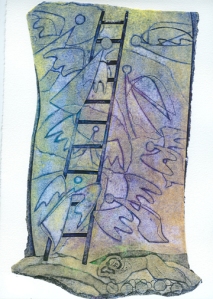Now Aaron’s sons Nadab and Abihu each took his fire pan, put fire in it, and laid incense on it; and they offered before the Lord alien fire, which He had not enjoined upon them. And fire came forth from the Lord and consumed them; thus they died at the instance of the Lord. Then Moses said to Aaron, “This is what the Lord meant when he said:
Through those near to Me I show Myself holy, And gain glory before all people.” And Aaron went silent.
Leviticus 10:1-3 (TANAKH)
 Oh, Leviticus, Leviticus, how you give God a really bad name. This is the kind of stuff that give PR people nightmares at night. It gives me nightmares too, trying to explain why God would do these things.
Oh, Leviticus, Leviticus, how you give God a really bad name. This is the kind of stuff that give PR people nightmares at night. It gives me nightmares too, trying to explain why God would do these things.
If we were to use Leviticus alone as our source for knowing who God is, it really would not be a nice picture. When reading this book it seems that the holiness God asks for requires us to negate what it means to be human. God here is not happy with blemishes of any kinds, nor dead bodies, nor blood, nor sex, nor childbirth, nor skin rashes, nor bodily discharges of any kind (including menstruation), nor improperly cooked sacrifices, nor nakedness (unless one owns the nakedness, check out Lev. 18), nor an assortment of all sorts of other things.
I’m sure by now you know that something here really bothers me. In Genesis I read that all that God made was good. Later in the Gospel according to John I read that “[t]he Word became flesh and lived among us . . .” (John 1:14). God became flesh . . . the same flesh that gets skin rashes, has bodily discharges, prepares its dead, is born of a woman, who menstruates and goes into labor, comes into the world naked, and can easily forget how to make a sacrifice.
In coming into the world God reminded us that holiness was not situated in negating the created order but instead in honoring it by living a life of love towards self, others, & God.
So as people who take the story of faith seriously, what are we to do with Leviticus? What do you think?








